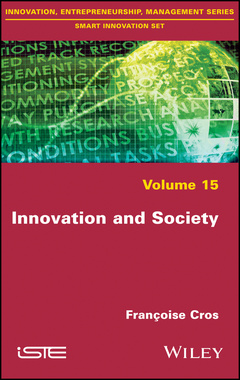Innovation and Society
Auteur : Cros Françoise

This book takes stock of the state of the question on innovation in a particular area of ??education and training. But for this it must be noted that economists have appropriated the notion since Schumpeter and have constrained to think innovation in professions of intervention on others as if they were products to be delivered to the customer as quickly and the best (frugal innovation). Here the author brings a nuance and demonstrates the specificity of innovations in "soft" areas, their richness, while drawing the reader to caution and criticism because any innovation is not good in itself: it can Produce adverse effects in the medium and long term. The author proposes two supports for innovation: on the one hand the approach by its most objective evaluation which itself induces an innovation in its evaluation and, on the other hand, an approach to values ??and therefore to philosophy of the desired future man. A detour on the history of innovation, on its international approaches, on the imaginary investments it is often the object of (with a nuance of utopia) makes it possible to understand why innovation has been a means To drive the reforms and to convince people for a better future.
Introduction ix
Chapter 1 Innovation in Socio-Historical Context 1
1.1 Meaning and significance of the word “innovation” 1
1.1.1 The origins of innovation 1
1.1.2 Innovation as the inverse of tradition 3
1.1.3 Innovation versus invention and creation 4
1.1.4 Innovation and creativity: a brief incursion into school 7
1.2 Innovation in the world of beliefs and values 12
1.3 Innovation in schools: what is its definition? 19
1.4 Innovation as progress 29
1.5 Techno-economic innovation and innovation in schools: Tocqueville and Schumpeter 31
1.6 Innovation and its process of socialization 35
1.7 Innovation and its future 49
1.8 From technical innovation to social innovation 51
1.8.1 Different innovations: characteristics and implications 51
1.8.2 Technical innovation and social innovation 52
1.8.3 Innovation of withdrawal and frugal innovation 55
Chapter 2 Innovation in Schools and its Social Forms 65
2.1 Innovation in schools as social innovation 65
2.2 Educational transition as innovation in schools 67
2.3 How do we identify innovation in schools? 73
2.4 Innovation in schools and “best practice” 77
2.5 Promotion and transfer of innovation in schools 80
2.5.1 Promotion 80
2.5.2 Transfer of innovation 83
2.5.3 The perpetuation of an innovation within an educational establishment 109
2.6 Critical analysis of examples of innovation in schools 111
2.6.1 Elementary level 117
2.6.2 Junior high level 117
2.6.3 High school level 117
2.6.4 Innovation never comes alone 118
2.6.5 Innovation is not born of nothing 119
2.6.6 Is innovation only old pedagogy in a new wrapper? 120
2.7 Innovation in schools and its support 122
2.8 The place of pedagogic movements and great pedagogues 126
2.8.1 The instigators 127
2.8.2 The great pedagogues 128
2.8.3 Pedagogic movements 128
2.8.4 Pedagogic currents 129
2.9 Training innovation in schools 132
2.9.1 There is innovation, and innovation 132
2.9.2 Well-identified competences for the innovative spirit? 134
2.9.3 Intersecting competences for developing innovation 135
2.9.4 Ways of training trainers to develop a global capacity for innovation 137
Chapter 3 Innovation in Schools: Issues for Policy and Governance 139
3.1 Innovating schools: learning schools? 139
3.2 Evaluating innovation in schools 142
3.3 Innovation in schools and research 146
3.3.1 Evidence-based policy 147
3.3.2 Action research or training research 148
3.3.3 Research as a competence of innovators 148
3.4 Innovation in schools in European countries 150
3.5 The five stages of public policy for supporting innovation in France 154
3.5.1 Innovation, a marginal subject (1960–1980) 154
3.5.2 Innovation as a process to be channeled (1981–2000) 155
3.5.3 Innovation becomes a competence for actors in the education system (2001–2010) 157
3.5.4 Innovation as a social regulator (2011–2017) 161
Conclusion 175
General Bibliography 181
Index 187
Date de parution : 03-2018
Ouvrage de 224 p.
15.5x23.9 cm
Thème d’Innovation and Society :
Mots-clés :
introduction; context; sociohistorical; innovation; origins; inverse; tradition; school; incursion; brief; world; beliefs; schools; definition; progress; technoeconomic; schools tocqueville; socialization



